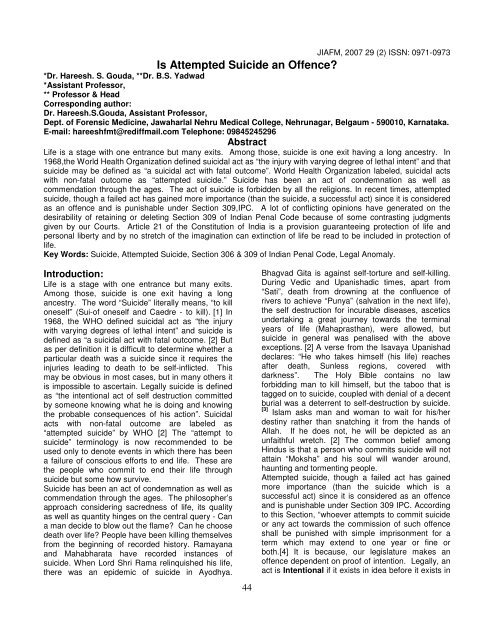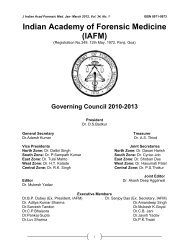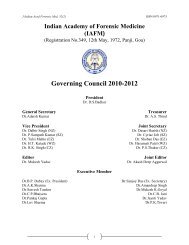Journal of Indian Academy of Forensic Medicine (JIAFM)
Journal of Indian Academy of Forensic Medicine (JIAFM)
Journal of Indian Academy of Forensic Medicine (JIAFM)
You also want an ePaper? Increase the reach of your titles
YUMPU automatically turns print PDFs into web optimized ePapers that Google loves.
44<br />
<strong>JIAFM</strong>, 2007 29 (2) ISSN: 0971-0973<br />
Is Attempted Suicide an Offence?<br />
*Dr. Hareesh. S. Gouda, **Dr. B.S. Yadwad<br />
*Assistant Pr<strong>of</strong>essor,<br />
** Pr<strong>of</strong>essor & Head<br />
Corresponding author:<br />
Dr. Hareesh.S.Gouda, Assistant Pr<strong>of</strong>essor,<br />
Dept. <strong>of</strong> <strong>Forensic</strong> <strong>Medicine</strong>, Jawaharlal Nehru Medical College, Nehrunagar, Belgaum - 590010, Karnataka.<br />
E-mail: hareeshfmt@rediffmail.com Telephone: 09845245296<br />
Abstract<br />
Life is a stage with one entrance but many exits. Among those, suicide is one exit having a long ancestry. In<br />
1968,the World Health Organization defined suicidal act as “the injury with varying degree <strong>of</strong> lethal intent” and that<br />
suicide may be defined as “a suicidal act with fatal outcome”. World Health Organization labeled, suicidal acts<br />
with non-fatal outcome as “attempted suicide.” Suicide has been an act <strong>of</strong> condemnation as well as<br />
commendation through the ages. The act <strong>of</strong> suicide is forbidden by all the religions. In recent times, attempted<br />
suicide, though a failed act has gained more importance (than the suicide, a successful act) since it is considered<br />
as an <strong>of</strong>fence and is punishable under Section 309,IPC. A lot <strong>of</strong> conflicting opinions have generated on the<br />
desirability <strong>of</strong> retaining or deleting Section 309 <strong>of</strong> <strong>Indian</strong> Penal Code because <strong>of</strong> some contrasting judgments<br />
given by our Courts. Article 21 <strong>of</strong> the Constitution <strong>of</strong> India is a provision guaranteeing protection <strong>of</strong> life and<br />
personal liberty and by no stretch <strong>of</strong> the imagination can extinction <strong>of</strong> life be read to be included in protection <strong>of</strong><br />
life.<br />
Key Words: Suicide, Attempted Suicide, Section 306 & 309 <strong>of</strong> <strong>Indian</strong> Penal Code, Legal Anomaly.<br />
Introduction:<br />
Life is a stage with one entrance but many exits.<br />
Among those, suicide is one exit having a long<br />
ancestry. The word “Suicide” literally means, “to kill<br />
oneself” (Sui-<strong>of</strong> oneself and Caedre - to kill). [1] In<br />
1968, the WHO defined suicidal act as “the injury<br />
with varying degrees <strong>of</strong> lethal intent” and suicide is<br />
defined as “a suicidal act with fatal outcome. [2] But<br />
as per definition it is difficult to determine whether a<br />
particular death was a suicide since it requires the<br />
injuries leading to death to be self-inflicted. This<br />
may be obvious in most cases, but in many others it<br />
is impossible to ascertain. Legally suicide is defined<br />
as “the intentional act <strong>of</strong> self destruction committed<br />
by someone knowing what he is doing and knowing<br />
the probable consequences <strong>of</strong> his action”. Suicidal<br />
acts with non-fatal outcome are labeled as<br />
“attempted suicide” by WHO [2] The “attempt to<br />
suicide” terminology is now recommended to be<br />
used only to denote events in which there has been<br />
a failure <strong>of</strong> conscious efforts to end life. These are<br />
the people who commit to end their life through<br />
suicide but some how survive.<br />
Suicide has been an act <strong>of</strong> condemnation as well as<br />
commendation through the ages. The philosopher’s<br />
approach considering sacredness <strong>of</strong> life, its quality<br />
as well as quantity hinges on the central query - Can<br />
a man decide to blow out the flame? Can he choose<br />
death over life? People have been killing themselves<br />
from the beginning <strong>of</strong> recorded history. Ramayana<br />
and Mahabharata have recorded instances <strong>of</strong><br />
suicide. When Lord Shri Rama relinquished his life,<br />
there was an epidemic <strong>of</strong> suicide in Ayodhya.<br />
Bhagvad Gita is against self-torture and self-killing.<br />
During Vedic and Upanishadic times, apart from<br />
“Sati”, death from drowning at the confluence <strong>of</strong><br />
rivers to achieve “Punya” (salvation in the next life),<br />
the self destruction for incurable diseases, ascetics<br />
undertaking a great journey towards the terminal<br />
years <strong>of</strong> life (Mahaprasthan), were allowed, but<br />
suicide in general was penalised with the above<br />
exceptions. [2] A verse from the Isavaya Upanishad<br />
declares: “He who takes himself (his life) reaches<br />
after death, Sunless regions, covered with<br />
darkness”. The Holy Bible contains no law<br />
forbidding man to kill himself, but the taboo that is<br />
tagged on to suicide, coupled with denial <strong>of</strong> a decent<br />
burial was a deterrent to self-destruction by suicide.<br />
[3] Islam asks man and woman to wait for his/her<br />
destiny rather than snatching it from the hands <strong>of</strong><br />
Allah. If he does not, he will be depicted as an<br />
unfaithful wretch. [2] The common belief among<br />
Hindus is that a person who commits suicide will not<br />
attain “Moksha” and his soul will wander around,<br />
haunting and tormenting people.<br />
Attempted suicide, though a failed act has gained<br />
more importance (than the suicide which is a<br />
successful act) since it is considered as an <strong>of</strong>fence<br />
and is punishable under Section 309 IPC. According<br />
to this Section, “whoever attempts to commit suicide<br />
or any act towards the commission <strong>of</strong> such <strong>of</strong>fence<br />
shall be punished with simple imprisonment for a<br />
term which may extend to one year or fine or<br />
both.[4] It is because, our legislature makes an<br />
<strong>of</strong>fence dependent on pro<strong>of</strong> <strong>of</strong> intention. Legally, an<br />
act is Intentional if it exists in idea before it exists in









